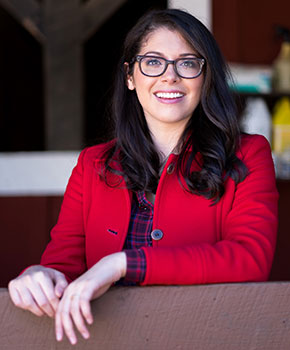My graduate work provided essential training for my current position as well as fostered a level of independence and training in mentorship that I plan to use and expand upon as I progress in my career.
 What made you decide to come to Brown for Graduate School?
What made you decide to come to Brown for Graduate School?
I was drawn to Brown’s Biotechnology program because I wanted apply my basic biology background to more translatable, human health and disease-related projects. Also, I was really impressed and excited about the amount of support given to students and faculty to pursue interdisciplinary projects.
What school did you come from and what did you study as an undergraduate?
I completed my bachelor of arts in Botany at Connecticut College (New London, CT), and it was here that I fell in love research. Conducting research became the “glue” of my undergraduate career and allowed me to apply concepts/techniques I learned in the classroom to try to answer novel questions!
What made you decide to go to Graduate School?
After completing my undergraduate degree, I worked as a research technician at Massachusetts General Hospital and then at a small biotech company. After two years, I realized that I ultimately wanted to be an independent researcher, and in order to do so, I needed the training a graduate degree provides.
What was your research at Brown?
I completed my doctorate out of Dr. Eric Darling’s lab. I had an incredible opportunity to merge his experience studying cell heterogeneity with my own interests in neurodegenerative diseases. Specifically, I developed a novel technology to generate protein signatures from specific cell subpopulations and applied this method to investigate how different cell types contribute to Alzheimer’s disease pathology.
What did you get from your PhD at Brown?
By completing my PhD at Brown, I significantly improved my critical thinking and communication skills. In addition to excellent research training, I had ample opportunities to expand my teaching, mentoring, and leadership skills. By the end of my doctorate, I became a much more independent and confident scientist.
Where are you now and how did Brown help you get there? How has your education helped you in your current job?
I am currently a Postdoctoral Fellow in the Neuroscience Institute at NYU Langone Medical Center. My graduate work provided essential training for my current position as well as fostered a level of independence and training in mentorship that I plan to use and expand upon as I progress in my career.
Given the outcome of your degree would you make the same decision to come to Brown?
Absolutely! Brown gave me the tools to pursue my dream career as an independent researcher. Equally as important, I joined a community of brilliant, talented, and caring people—many of whom I know I will be close friends with for life.
